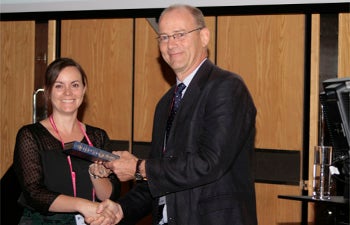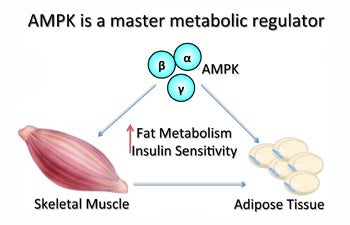Taking Aim at Diabetes
As rates of obesity-linked Type 2 diabetes soar worldwide, scientific research advancing our understanding of this potentially fatal disease is crucial. Experts warn that if current trends continue, one in three Americans will suffer from the condition by 2050.
Marcia Abbott, who earned a Ph.D. in integrative and evolutionary biology from USC Dornsife in 2010, has been investigating how a high fat diet affects insulin resistance in skeletal muscles — known to be a precursor and indicator of Type 2 diabetes. Abbott’s field is now called human and evolutionary biology at USC Dornsife.
Her work has been recognized with the prestigious Early Career Author Prize awarded by Experimental Physiology. Abbott traveled to the United Kingdom to receive the award, presented on July 25 at the 37th World Congress of the International Union of Physiological Sciences (IUPS) held in Birmingham, England.
The British journal published her paper on insulin resistance in May 2012. Experimental Physiology’s Editor-in-Chief Paul McLoughlin informed Abbott she had won the award, which was established in 2009 to reward early career authors for outstanding papers published in the journal.
“I was really excited and a little bit in disbelief when I got the news,” Abbott said. “I was really honored to be invited to the conference and to receive the award after the Paton Prize Lecture. It’s thrilling to get my research out there and to get some international awareness.”

USC Dornsife alumna Marcia Abbott receives the Early Author Career Prize for her research on Type 2 diabetes from Experimental Physiology’s Editor-in-Chief Paul McLoughlin at the 37th World Congress of the International Union of Physiological Sciences (IUPS) held July 25 in Birmingham, England. Photo by Jacob Lonsdale.
Abbott’s research focused on the critical role in the regulation of skeletal muscle metabolism played by energy-sensing enzyme AMP-activated protein Kinase (AMPKα2).
Her paper showed that making AMPKα2 inactive was implicated in regulating overall metabolism and possibly insulin sensitivity. Her study may provide important information for the prevention and/or treatment of insulin resistance and Type 2 diabetes.
Abbott sought to learn whether a lack of AMPKα2 activity in skeletal muscles would affect the magnitude of insulin resistance that occurs with a high fat diet.
“We wanted to know if mice would become more insulin resistant if they didn’t have this enzyme, compared to non-genetically modified mice that were also on a high fat diet,” Abbott said. “We did find that AMPKα2 is important in regulating insulin stimulated fuel use, such as fat. Without the AMPKα2 enzyme the mice were unable to respond to insulin properly and maintain the metabolism of fatty acids in the skeletal muscle.”
The fact that AMPKα2 may be important for maintaining insulin sensitivity means that the enzyme could be used in the development of possible diabetes therapies, Abbott said.
“We found that without AMPKα2, the muscle is less insulin sensitive while on a high fat diet,” she said. “So if we could regulate the enzyme’s activity then we might be able to control the insulin resistance that occurs due to a high fat diet. Obviously that is highly relevant for humans because the population is becoming increasingly obese and unhealthy and Type 2 diabetes is a huge problem.”

The enzyme AMPK is responsible for regulating many metabolic processes; such as fat metabolism which in turn maintains insulin sensitivity in skeletal muscle and may signal to adipose tissue. Further insight into the role of AMPK activity may help in the prevention and/or treatment of Type 2 diabetes. Diagram courtesy of Marcia Abbott.
Abbott is now a post-doctoral research fellow at University of California, San Francisco where she is studying the effects of fat cells on stem cell commitment.
The Early Author Career Prize goes to an applicant who earned his or her research degree fewer than six years prior to submitting the paper.
Commenting on her award, Abbott acknowledged her doctoral adviser at USC Dornsife, Lorraine Turcotte, associate professor of biological sciences. Turcotte was a co-author on Abbott’s award-winning paper, along with Silvana Constantinescu, formerly a researcher in the same department and now a postdoctoral fellow and faculty instructor at Charles R. Drew University in Los Angeles, Calif.
“I really appreciated Lorraine’s hands-on approach,” Abbott said of her time at USC Dornsife. “Now that I’ve been at other universities following my Ph.D., I feel that she was an excellent mentor in guiding me to become a better scientist.”
Turcotte praised Abbott’s work.
“As a graduate student in my lab, Marcia was outstanding technically and she was an innovative thinker,” Turcotte said. “So it’s great to see that other scientists recognize her exceptional accomplishments.”